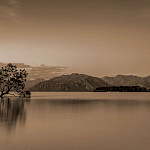The Divine Side of Things
“In the year that King Uzziah died I saw the Lord, high and lifted up.” (Isa. 6:1)
Isaiah had never had that kind of vision before. Most certainly he had had spiritual experiences, but never one in which the Lord was so exalted in overwhelming glory. And the strange thing is that the vivid vision blazed upon him through the pall of the blackest night. His ambitions had been dashed in disappointment; his life was lying in confusion. Uzziah had fallen, he who was “the pillar of a people’s hopes,” and it seemed as if the chariot of progress was irreparably overthrown.
And it was in that dark hour, when the glory of Uzziah had vanished in death, and when Isaiah’s own prospective glory had faded away, that the glory of the Lord arose like the rising of the sun after a black, tempestuous night. Isaiah bad been too entirely engrossed with the human side of things. Now his eyes were turned to the divine side of things, and he began to live and serve in the consciousness of the glory of the Lord. “I saw the Lord, high and lifted up.”
And that is surely one of the purposed ministries of apparent misfortune and disaster, to open out the divine side of things and to unveil the heavenly glory. And indeed we may say that the seeming failure is no failure at all if it uncover the divine; the calamity has then become the medium of a greater triumph. A dear sister who went through a lot of suffering and pain wrote down these words: “My long experience in the Valley of Humiliation has effectually lid me of the longing to see my glory!” She had been ravished by a vision of the glory of the Lord, and all smaller fears and resentments had faded away.
When our troubles destroy the yearning for our own glory they have been converted into the ministers of spiritual growth. The apparent rotting of the flax, when it is thrown into the seemingly unfriendly tanks, prepares the stronger strands for finished webs. And when our vanities, and our self-gloryings, rot away in the waters of hardship or affliction, we may be sure that the bitter waters have ministered to us as the veritable waters of life. When "my glory” changes into "Thy glory,” and when we are led to pray, "Show me Thy glory,” the valley of Achor has become a door of hope.
And that is how we may test our trend and our progress. Are our little gloryings fading away in the presence of something brighter? Are the mere stage-lights and the limelights going out? Is ambition changing into aspiration? Is sight becoming insight? Are we seeing behind the veil? Are we catching the vision of the divine side of things, the glory of the Lord? Is quest of personal glory changing into prayer, and worship, and consecrated service? Are we finding our God in the night? Do we see Jesus walking across the troubled seas? “In the year that King Uzziah died I saw the Lord!”
Previous article Next article




